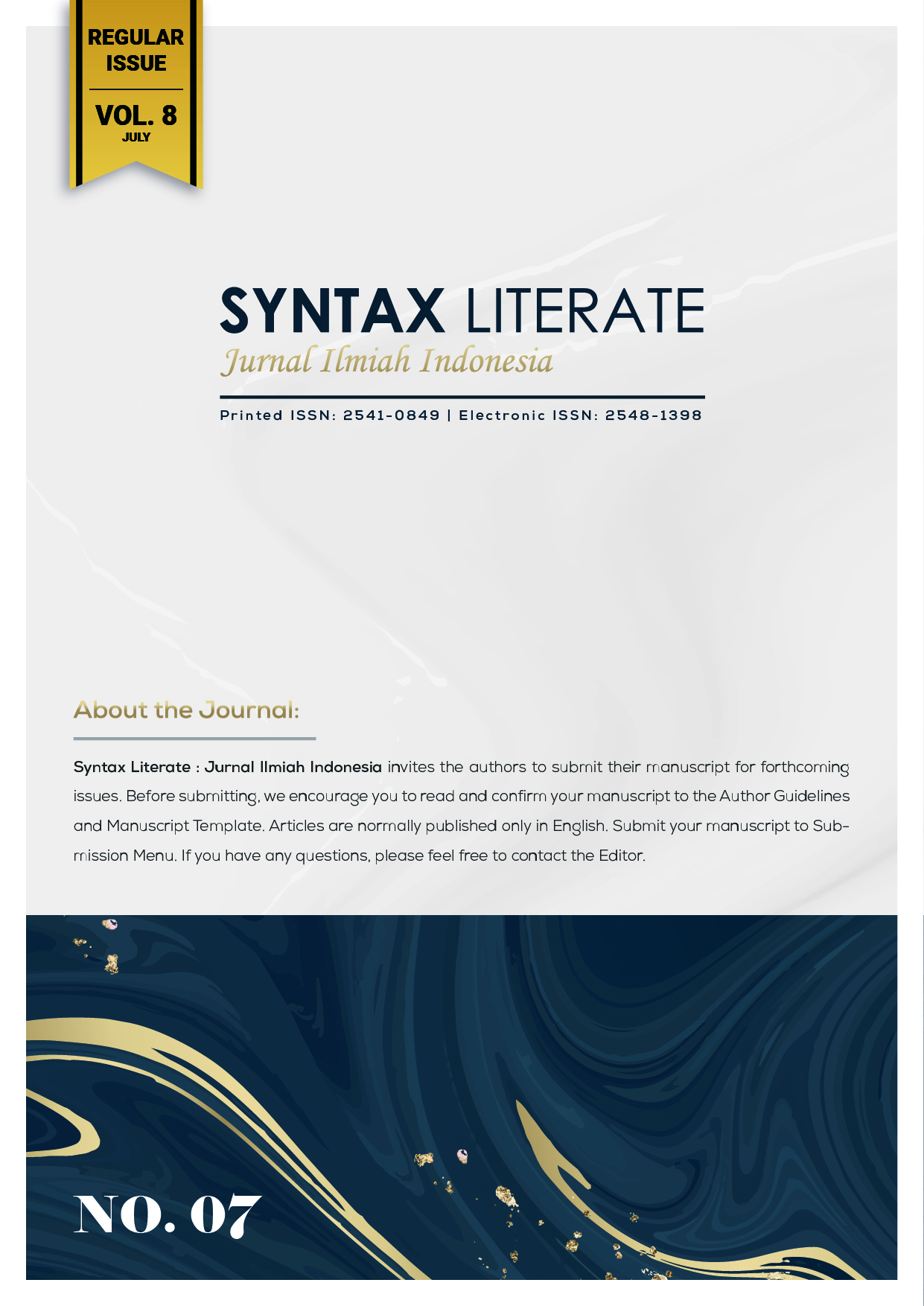Optimalisasi Dana Zakat dan Pemberdayaan Ekonomi Umat di Indonesia
Abstract
Zakat as the third pillar of Islam is one of the fundamental things in Islamic teachings. Zakat has a social dimension to become a separate identity that can have a good impact on society, both as an effort to worship Allah and as an effort to social care with fellow human beings. However, zakat is not only limited to having this function. Optimizing the distribution of zakat funds in a professional manner will have a better impact on distribution or income efforts to the community. This study uses a descriptive approach. Data sources are obtained from data in the form of books, articles, and processed data from other parties or publication data, such as BAZNAS publication data and those related to this research in Google Schoolar. The results of this study Zakat, infaq, and alms are a form of worship for a Muslim with the aim of seeking the pleasure of Allah SWT. In carrying out zakat, infaq, and alms can reduce the amount of poverty that exists. Therefore it is necessary to have a management body that manages zakat, infaq, and alms that can manage it properly, and can improve the community's economy.
Downloads
References
Amalia, Neva Madinatul, Amarta, Cindy Cintania, & Erlangga, Renaldy Trisna. (2021). Optimalisasi Dana Zakat dalam Pemberdayaan Masyarakat. Jihbiz Jurnal Ekonomi Keuangan Dan Perbankan Syariah, 5(2), 104–119. https://doi.org/10.33379/jihbiz.v5i2.870
Apriliyani, Sri, Malik, Zaini Abdul, & Surahman, Maman. (2020). Peran Lembaga Amil Zakat, Infaq dan Shadaqah Muhammadiyah (Lazismu) Banjarnegara dalam Meningkatkan Perekonomian Kaum Dhuafa. Prosiding Hukum Ekonomi Syariah, 89. https://doi.org/10.29313/syariah.v0i0.20982
Arief, Abd. Salam. (2016). Zakat, Tanggung Jawab Sosial, dan Pemberdayaan Ekonomi Umat. Asy-Syir’ah: Jurnal Ilmu Syari’ah Dan Hukum, 50(2), 341–353.
Budiman, Moch. (2005). Melacak Praktik Pengelolaan Zakat di Indonesia Pada Masa Pra-Kemerdekaan. Jurnal Khazanah, IV(1), 241–262. Retrieved from http://jurnal.uin-antasari.ac.id/index.php/khazanah/article/view/3160
Canggih, Clarashinta, Fikriyah, Khusnul, & Yasin, Ach. (2017). Potensi Dan Realisasi Dana Zakat Indonesia. Al-Uqud : Journal of Islamic Economics, 1(1), 14. https://doi.org/10.26740/jie.v1n1.p14-26
Hendri, Nedi, & Suyanto, Suyanto. (2022). Analisis Model-Model Pendayagunaan Dana Zakat Dalam Pemberdayaan Masyarakat Miskin Kota Di Provinsi Lampung. Akuisisi, 11(2), 63–73. Retrieved from http://fe.ummetro.ac.id/ejournal/index.php/JA/article/view/25
Khatimah, Husnul, & Nuradi. (2020). Optimalisasi Zakat Melalui Pemberdayaan Muzakki. Rayah Al-Islam, 4(02), 244–256. https://doi.org/10.37274/rais.v4i02.90
Ma’mun, Mansur TB. (2017). Prospek Penerapan Zakat Pengurang Pajak Penghasilan Sebagai Alternatif Kebijakan Fiskal Di Indonesia. Jurnal Riset Manajemen Dan Bisnis (JRMB) Fakultas Ekonomi UNIAT, 2(September), 187–200. https://doi.org/10.36226/jrmb.v2is1.53
Mubasirun, Mubasirun. (2013). Distribusi Zakat Dan Pemberdayaan Ekonomi Umat. Inferensi, 7(2), 493. https://doi.org/10.18326/infsl3.v7i2.493-512
Najiyah, Faridatun, Khasanah, Ulfatul, & Asas, Fitria. (2022). Manajemen zakat di Indonesia (tantangan dan solusi). Insight Management Journal, 2(2), 45–53. https://doi.org/10.47065/imj.v2i2.115
Najma, Siti. (2014). Optimalisasi Peran Zakat untuk Pengembangan Kewirausahaan Umat Islam. Media Syariah, 16(1), 143–174.
Rianto, M. Nur, & Arif, Al. (2013). Memberdayakan Perekonomian Umat. Optimalisasi Peran Zakat Dalam Memberdayakan Perekonomian Umat, 14(1), 1–16. Retrieved from https://e-resources.perpusnas.go.id:2057/docview/2030924291?accountid=25704
Thoharul Anwar, Ahmad. (2018). Zakat Produktif Untuk Pemberdayaan Ekonomi Umat. ZISWAF : Jurnal Zakat Dan Wakaf, 5(1), 41. https://doi.org/10.21043/ziswaf.v5i1.3508
Zetira, Annisa, & Fatwa, Nur. (2021). Optimalisasi Penghimpunan Zakat Digital Di Masa Pandemi. Eqien: Jurnal Ekonomi Dan Bisnis, 8(2). https://doi.org/10.34308/eqien.v8i2.241
Copyright (c) 2023 Dina Arfianti Siregar, Asmuni, Tuti Anggraini

This work is licensed under a Creative Commons Attribution-ShareAlike 4.0 International License.











